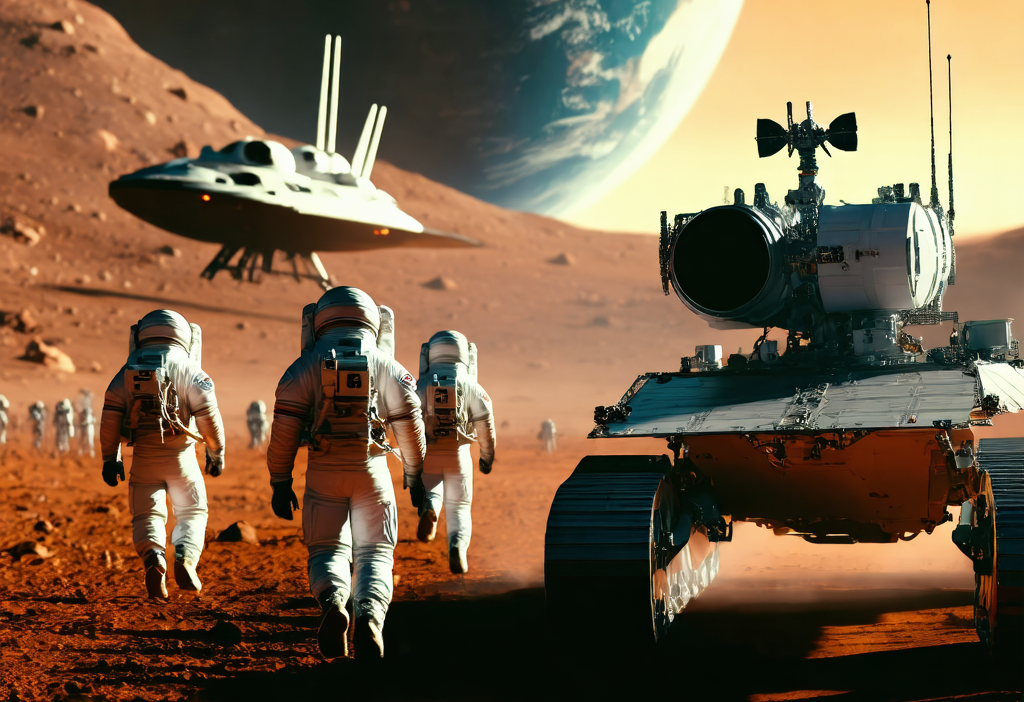The Future of Space Exploration: Pioneering New Frontiers
As we stand on the brink of a new era, space exploration is poised to undergo unprecedented transformations. The race to the stars is no longer just about reaching them—it’s about understanding, colonizing, and harnessing the resources that lie beyond our planet. In this blog, we’ll delve into the exciting possibilities and challenges that await us in the future of space exploration.
The Technological Leap Forward
The advancements in technology are setting the stage for a new wave of exploration. Here’s what you need to know:
- Rocket Reusability: Companies like SpaceX have revolutionized space travel by making rockets reusable, drastically reducing costs and paving the way for more frequent missions.
- AI-Driven Missions: Artificial intelligence is playing a pivotal role in planning and executing complex missions, ensuring efficiency and minimizing risks.
- New Propulsion Systems: Breakthroughs in propulsion technology, such as nuclear thermal propulsion, could slash travel times to distant planets like Mars.
The integration of these technologies is not just theoretical—it’s happening now. The next generation of spacecraft will be faster, more efficient, and capable of carrying larger payloads than ever before.
Private Enterprises Leading the Charge
Gone are the days when space exploration was solely the domain of governments. Private enterprises like Blue Origin, SpaceX, and
The competition is healthy, and it’s leading to rapid advancements in all areas of space exploration:
- Space Tourism: The idea of vacationing on the moon or Mars is no longer science fiction. Virgin Galactic has already taken passengers to space, and more companies are planning similar ventures.
- Moon Colonies: Blue Origin’s vision for lunar cities is a step closer to reality, with plans to establish permanent human settlements on the Moon within the next decade.
- Mars Exploration: SpaceX aims to send humans to Mars as early as 2030, with plans for sustainable colonization.
The Human Element: Colonizing Space
While robots and AI are essential tools in space exploration, the ultimate goal is to establish human colonies beyond Earth. This ambitious vision comes with its own set of challenges:
- Living Off the Land: In-situ resource utilization (ISRU) technologies will enable colonists to extract water and oxygen from celestial bodies, reducing reliance on Earth.
- Protecting Against Radiation: Developing shielding technologies to protect humans from harmful cosmic radiation is a top priority.
- Mental Health: The isolation and confinement of space travel can have profound psychological effects. Researchers are studying ways to mitigate these challenges, including virtual reality therapy and better communication systems.
The first Martian colony will be a milestone in human history—a testament to our ingenuity and determination. But it’s not just about survival; it’s about thriving in an alien environment.
Ethical Considerations: The Final Frontier’s Moral Compass
As we push further into space, we must also grapple with the ethical implications of our actions:
- Planetary Protection: Ensuring that we don’t contaminate other planets with Earth-based microbes is crucial for preserving the integrity of potential ecosystems.
- Resource Allocation: Deciding how to fairly distribute resources like water and minerals on other planets will be a complex challenge, especially as multiple nations and corporations stake their claims.
- Ethics of Human Experimentation: Sending humans to space for long durations requires careful consideration of the risks involved. Balancing scientific progress with human safety is a delicate equation.
These ethical dilemmas are not just abstract concerns—they’re real issues that will shape how we interact with the cosmos in the coming decades.
The Road Ahead: Predictions for the Next 50 Years
What does the future hold? Here’s a glimpse:
- Near-Term Achievements: Within the next decade, we can expect the first human mission to Mars and the establishment of permanent lunar bases.
- Mid-Term Developments: By 2050, space tourism could become mainstream, with regular flights to low Earth orbit and beyond. Meanwhile, mining operations on asteroids could provide valuable resources for both Earth and space colonies.
- Long-Term Vision: The next century could see the establishment of thriving human settlements on Mars and possibly other planets. The search for extraterrestrial life will continue to be a major focus, with advanced probes exploring the moons of Jupiter and Saturn.
The future of space exploration is bright, but it’s not without its challenges. As we venture further into the cosmos, we must remain vigilant in addressing both technical and ethical issues. The journey ahead is filled with promise, and it’s a journey that we’re all part of—whether as explorers, scientists, or simply curious observers.
One thing is certain: the universe is waiting for us to explore its secrets. And as we continue to push the boundaries of what’s possible, we’ll not only uncover new worlds but also gain a deeper understanding of our own place in the cosmos.





